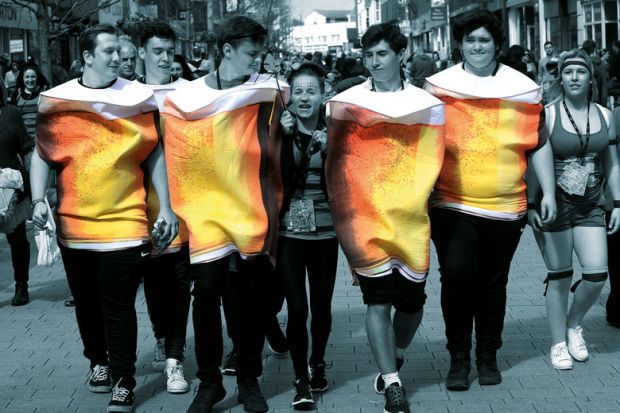I was once in a campus security team meeting when a veteran guard asked a pointed question: if the average academic works 60 hours per week – and not all of that on site – who looks after students for the remaining 108?
The answer, of course, is us. Being around during the wee hours of anxiety and intoxication means we see a side of student life – and student psychology – that lecturers typically don’t. But we’ve been on our own even during academic hours for most of the pandemic. And even though there have also been fewer students around campus, we’re definitely glad that the reinforcements are finally arriving.
Whether you like it or not, academics are our early warning system: your tip-offs about which students you think need help are invaluable to us as we try to decide where best to direct our late-night support. Equally, though, our experience of multiple out-of-hours rescue missions – and not only with “Generation Covid”, as they’re being branded – puts us in a position to give academics some tips on how to minimise students’ stress and spot warning signs.
One important pointer is to think before you leap to conclusions this term. With some module content still being delivered online at most institutions, it may be hard to keep track of who is keeping up. If you spot empty screens or seats, please don’t flag them all up with us as missing persons unless you seriously suspect foul play. Thanks to misinformation, some students could be as wary of registering for digital attendance tracking as they are of getting the jab. Or it may simply be that the extended teaching hours that social distancing necessitates don’t fit in with their social schedules.
On the subject of which, you should probably go easy on that red-eyed student whose bottle-bank breath is detectable even from the back row of the lecture theatre. Even in normal years, I have encountered “chunder charts” in communal kitchens – not to mention an Instagram ransom demand for a neighbour’s dreadlocks, cut off the previous night while they slept. But Generation Covid were in lockdown at a time when 17-year-olds would otherwise be experimenting with their personal booze thresholds. This will no doubt mean some catching up at university. Going at them drill sergeant-style is unlikely to win any allies. Why not, instead, offer the incentive of an Amazon voucher for best attendance? Or slip a stark image of alcoholic overindulgence into the slide deck for your first lecture – a Shane MacGowan photo should do it.
Neither academic nor support service staff need security to remind them to respect boundaries. But many students will need reassurance, which should be given readily – provided it doesn’t turn into surrogate parenting. Also bear in mind that social distancing may not always explain why students appear remote or cut off: anyone coming in through clearing might be living alone in overspill accommodation in a local B&B, for instance.
The more introverted students, who take longer to find a clique, can also be hard to spot: all staff should be vigilant. That is especially true regarding isolated males, who may gravitate towards the so-called incel movement if they are cut out of the orgiastic keg parties that happen round the clock on campus (thanks to Hollywood for putting that idea in their heads).
Speaking as one of the people lucky enough to rearrange the bins each morning, I know that impressing the dreaded R word (responsibility) on new students is tricky. Freshers want their independence, but not necessarily the obligation that comes with it. In that sense, they’re like all other adults.
But 18-year-olds are a mixture of people who were forced to bring themselves up and people who’ve reached voting age without ever having switched on a washing machine. I’ve always thought that the latter could benefit from a freshers’ week reminder that university life is less Dude, Where’s My Car? than Dad’s Army.
Apart from learning to iron and not ransoming your neighbour’s hair, security’s top two tips to such students would be “keep your bike locked up” and “don’t sign in strangers as guests”. These may seem old hat to anyone millennial or older, but think back: wouldn’t it have been nicer if you had found them out the easy way?
It is also incumbent on staff to model responsibility when it comes to Covid safety. So please wear your masks. Yes, we know they make your ears ache and your glasses steam up, but they cut the chance of spreading infection by 65 per cent, according to studies by your colleagues. The students will likely wear their masks too if a senior figure gets the ball rolling. It can’t always be us: people seem to expect guards’ faces to be accessorised anyway, presumably because the rest of us is adorned with keys, radios, bodycams, torches and impressive multitools.
If you’ve forgotten your own mask and it’s too late to buy one from the campus shop, your friendly security colleague might bung you one from his or her stash. Just don’t turn up every day asking if we can sort you out – sadly, we missed out on the PPE importation racket. Besides, as an educator, wouldn’t you get sick of someone whose dog ate their homework every single morning?
George Bass is a security guard at a UK university.
Register to continue
Why register?
- Registration is free and only takes a moment
- Once registered, you can read 3 articles a month
- Sign up for our newsletter
Subscribe
Or subscribe for unlimited access to:
- Unlimited access to news, views, insights & reviews
- Digital editions
- Digital access to THE’s university and college rankings analysis
Already registered or a current subscriber? Login








